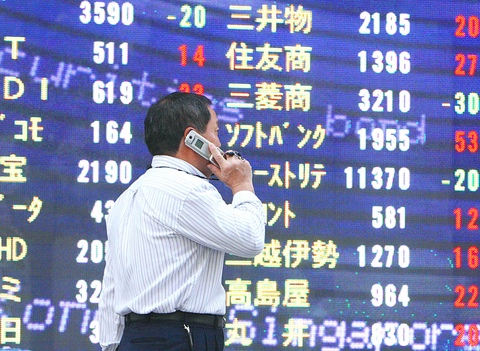Export-driven Asian economies are concerned about losing competitiveness as their currencies strengthen against a depressed US dollar, but a new study says the greenback is still significantly overvalued against the regional units.
The yuan needs to rise by about 30 percent against the dollar and the yen should strengthen by about 20 percent, said the study by the respected Washington-based Peterson Institute for International Economics.
It said that a number of other Asian currencies also needed to appreciate substantially so that desired increases of the yuan and yen amount to much less on a trade-weighted average basis — under 20 percent for the Chinese currency and only about 5 percent for the Japanese unit.

PHOTO: BLOOMBERG
“The Asian currencies that should appreciate most are the Singapore dollar, the Chinese renminbi [yuan], the Malaysian ringgit, the New Taiwan dollar and the Japanese yen,” said the report by the institute’s experts William Cline and John Williamson.
Cline was a former US Treasury official and ex-chief economist at the Institute of International Finance while Williamson was formerly with the World Bank and the IMF.
The report said “there remain significant undervaluations of a number of Asian currencies against the dollar and against several other advanced-country currencies including the euro, the British pound and the Canadian dollar.
“The long-standing overvaluation of the dollar in terms of those three currencies has now ended, however, and may even have mildly overshot,” it said.
The depreciation in the effective exchange rates of the euro and pound “should come largely from the appreciations of a number of Asian currencies,” the report said. “New estimates of fundamental equilibrium exchange rates.”
The Singapore dollar and the Swiss franc were identified as experiencing the “biggest undervaluations,” the study said.
Asian economies have always been worried that any exceptional strengthening of currencies will undermine export competitiveness over their main regional competitors, and dampen economic growth. A rising threat of inflation fueled by recent sharp jumps in oil and food prices has made exchange rate management a bigger challenge for Asian central banks, experts said.
On average, the study said, the dollar was now overvalued by less than 10 percent. It has declined by almost 25 percent since early 2002.
John Lipsky, the IMF’s deputy managing director, also said that the currencies of many current account surplus countries, including China, remained “substantially undervalued, despite a small appreciation in real effective terms.
“The lack of adjustment in the currencies of several economies with inflexible exchange rate regimes and large external surpluses has not been supportive of an adjustment in global imbalances,” he said.
The imbalances are reflected partly by huge current account surpluses in Asian economies and the opposite in the US and several other developed nations.
The IMF’s view is that the substantial dollar depreciation so far is helping to bring down the US current account deficit, and has moved the greenback close to its “medium-term equilibrium level.”

MORE VISITORS: The Tourism Administration said that it is seeing positive prospects in its efforts to expand the tourism market in North America and Europe Taiwan has been ranked as the cheapest place in the world to travel to this year, based on a list recommended by NerdWallet. The San Francisco-based personal finance company said that Taiwan topped the list of 16 nations it chose for budget travelers because US tourists do not need visas and travelers can easily have a good meal for less than US$10. A bus ride in Taipei costs just under US$0.50, while subway rides start at US$0.60, the firm said, adding that public transportation in Taiwan is easy to navigate. The firm also called Taiwan a “food lover’s paradise,” citing inexpensive breakfast stalls

TRADE: A mandatory declaration of origin for manufactured goods bound for the US is to take effect on May 7 to block China from exploiting Taiwan’s trade channels All products manufactured in Taiwan and exported to the US must include a signed declaration of origin starting on May 7, the Bureau of Foreign Trade announced yesterday. US President Donald Trump on April 2 imposed a 32 percent tariff on imports from Taiwan, but one week later announced a 90-day pause on its implementation. However, a universal 10 percent tariff was immediately applied to most imports from around the world. On April 12, the Trump administration further exempted computers, smartphones and semiconductors from the new tariffs. In response, President William Lai’s (賴清德) administration has introduced a series of countermeasures to support affected

CROSS-STRAIT: The vast majority of Taiwanese support maintaining the ‘status quo,’ while concern is rising about Beijing’s influence operations More than eight out of 10 Taiwanese reject Beijing’s “one country, two systems” framework for cross-strait relations, according to a survey released by the Mainland Affairs Council (MAC) on Thursday. The MAC’s latest quarterly survey found that 84.4 percent of respondents opposed Beijing’s “one country, two systems” formula for handling cross-strait relations — a figure consistent with past polling. Over the past three years, opposition to the framework has remained high, ranging from a low of 83.6 percent in April 2023 to a peak of 89.6 percent in April last year. In the most recent poll, 82.5 percent also rejected China’s

PLUGGING HOLES: The amendments would bring the legislation in line with systems found in other countries such as Japan and the US, Legislator Chen Kuan-ting said Democratic Progressive Party (DPP) Legislator Chen Kuan-ting (陳冠廷) has proposed amending national security legislation amid a spate of espionage cases. Potential gaps in security vetting procedures for personnel with access to sensitive information prompted him to propose the amendments, which would introduce changes to Article 14 of the Classified National Security Information Protection Act (國家機密保護法), Chen said yesterday. The proposal, which aims to enhance interagency vetting procedures and reduce the risk of classified information leaks, would establish a comprehensive security clearance system in Taiwan, he said. The amendment would require character and loyalty checks for civil servants and intelligence personnel prior to